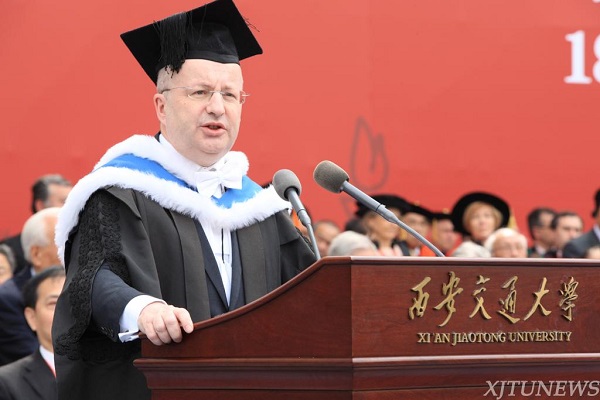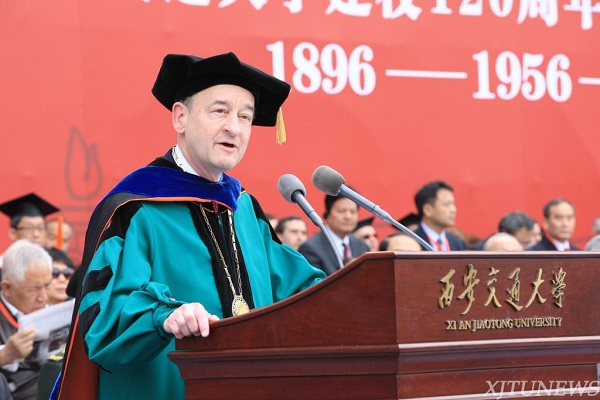The speech on World-Class university mobilization conference of Xi'an Jiaotong University by International and partner universities

Executive vice President at the university of Oxford in England Ewan Mckendrick
Mr Chairman, President Wang, Distinguished Guests:
It is an enormous privilege for me to be asked to speak today on behalf of your guests from Europe on the occasion of the 120th anniversary celebrations of this distinguished University. Anniversaries of this kind provide us with the opportunity to meet old friends, examine our history, consider the present and contemplate the future.
Before I talk about some of these issues, I should, perhaps, introduce myself. I am Professor Ewan McKendrick, a Professor in the Faculty of Law at the University of Oxford and the Registrar of the University. The title Registrar is one that does not translate very easily but, if I had to summarise my role, I would say that I am the senior administrative officer of the University. I report directly to our Vice-Chancellor (our President) and am her principal adviser on strategic policy and am responsible to her for the management and administration of the University. As someone who is responsible for university administration, I know how much work has to be put into an event of this nature and and on behalf of your guests I would like to thank those responsible for organising these anniversary celebrations for the hospitality which has been extended to us during our stay here in this wonderful city.
As I said, anniversary celebrations are an opportunity to meet with old friends. In my case this is my fourth visit to this University. I first came here in May 2013 to speak at a conference on international commercial law organised by the School of Law and the Silk Road Institute for International and Comparative Law. The conference was organised by the Dean of the Law School, Professor Shan, and my former doctoral student Professor Qiao Liu. Since that first visit I have returned to Xi’an on an annual basis and enjoyed the hospitality which this University has generously provided. It has been a particular pleasure to work with Dean Shan, his colleagues and to teach and work with graduate students in the Law School, some of whom are working under the supervision of Professor Liu. I have attended, and spoken at, a university graduation here which was an event on a scale much bigger than anything we could organise in Oxford. I have never seen so many happy students receive their degree, have their photographs taken with their Dean and all organised so efficiently. I have also been able to meet with President Wang and it was a particular pleasure for me to be able to welcome him, together with some of his senior colleagues, to Oxford earlier this year and to show him around parts of our University. He has been a good friend and is an inspiring and visionary leader.
But anniversaries are more than an opportunity to meet old friends. They also provide us with an opportunity to look back over our past, consider the present and contemplate the future. As we look back over 120 years we can easily see that the cities of Xi’an and Oxford are very different from how they were in 1896. The period between 1896 and 2016 has been one of enormous change, particularly in terms of technological change. And Universities have played, and will continue to play, a vital role in the development of these new technologies. But the changes that have taken place are not simply technological in nature: they are social, political and economic. An indication of the extent of the changes that have taken place can be seen by looking at the composition of our student body and the academics we employ.
In the case of the University of Oxford we have approximately 22,000 students: 11,500 undergraduates and 10,500 graduates. 41% of our students are citizens of foreign countries. Overseas students make up 63% of the graduate student population and 19% of the undergraduate population. Our students come from over 140 countries and territories and China supplies the second highest number of students, with just over 1,000 of our students coming from China. A similar picture emerges when I turn to staff numbers. The University employs approximately 12,000 employees. 65% of them are from the UK, 17% from the European Union and 14% from other countries in the world. Almost one third of our employees were not born in the UK, and that number is higher if it is confined to academic (rather than administrative) posts. This is a world which the Registrar of the University of Oxford in 1896 could not have imagined. His world was one in which students were mainly undergraduates, were born and would spend most of their lives in the United Kingdom and most of them were humanities students rather than students working in the sciences.
I suspect that those responsible for setting up this University in 1896 would similarly not have foreseen the changes and developments that have taken place in this University since it was founded. The developments in science and engineering, the expansion of graduate education, the international collaborations which are now such an important part of the lives of students and academics are all developments I am sure they could not have foreseen.
But where do we go from here? What does the future hold for great universities such as this University? The history of the last 120 years teaches us that we are unlikely to be able to predict what will happen over the next 120 years and so it might be said to be foolish to attempt to predict the future. But today I am willing to play the role of the fool and attempt to look into the future and make some general predictions.
First, the great universities of the world will become more international, not less. And the direction of travel will not be principally from the East to the West; it will be in both directions as Chinese universities climb their way up the international league tables. Greater numbers of students from the UK and Europe will want to study here in the future. The same will be true of academics. We may not in future need the MOUs that are currently a feature of the higher education landscape. We will not need them because our campuses will themselves be international, consisting of students and academics from many different parts of the world.
Second, science, engineering and medicine will play an even more important role in universities than they do today. I say this with some regret because I do not believe that the problems that confront this world can be solved only by scientists. Of course scientists have their role to play but so do scholars from the humanities and the social sciences. Problems such as climate change and migration and the challenges presented by an ageing population require academics from many disciplines to work together if we are to find solutions to these problems and challenges. The major challenges that confront our world cannot be confined within disciplinary boundaries and the leading universities of the world must develop greater inter-disciplinary research capacity if we are to make progress. Universities have traditionally organised themselves in disciplinary centres and we do not want to lose that disciplinary excellence. But at the same time we cannot permit disciplinary boundaries to impede inter-disciplinary research on some of the great challenges that confront our world.
Third, research in the future will be more collaborative than it is today, particularly in the sciences. The high cost of modern scientific research will require scientists to work together as they seek to develop new technologies and find cures for illnesses and diseases for which there is currently no cure. In the future scientists in Oxford and in Europe will work more collaboratively with scientists in Xi’an and China than they do today.
Fourth, universities will play an even greater role in national and international life than they do at present. The world will require more graduates and post-graduates, not less. The research conducted in universities will be translated more quickly into national economies as companies are formed to develop the research into products and services which will be of benefit to citizens. Universities will be much closer to the centre of national and international life.
I am sure that your University is well placed to meet these challenges and that the next 120 years will bring even more success and prestige to the University.
In closing I would like to offer a personal reflection. My link to this University was created by one of my former doctoral students, Professor Qiao Liu. He came to Oxford more than 10 years ago, first to study on a postgraduate masters programme and then to take his doctorate. I was then his supervisor. Today we are colleagues. He has produced an Australian version of my book on English contract law and next week we shall present our first joint paper at an international conference. He has introduced me to his doctoral students working in this University and I have had the privilege of teaching them and working with them. For me, this is how international collaborations work best. It develops over time, is based on friendship, mutual respect and a commitment to scholarship which transcends national boundaries. But it does require the support of the university, in particular the support of the university leadership. In my case, without the encouragement of President Wang, the support of Professor Shan, the Dean of the Law School, and the assistance of the department of international co-operation and exchanges it would not have been possible for me to develop my current links with this University and to spend time with, and work with, Professor Liu in the way that I have been able to do over the last three years. I am therefore personally grateful to this University for the support it has given to me, for the opportunity to engage in new research with Professor Liu, to teach and work with his students and to meet many academic colleagues from different parts of the University. It is a privilege to be here today and I wish you all every success in the future.

Remarks By
Chancellor Mark S. Wrighton
Washington University in St. Louis
St. Louis, Missouri, United States of America
We gather to celebrate the 120th anniversary of the founding of Xi’an Jiaotong University. This premier research university has a rich history and is located in a beautiful city of global importance. Xi’an is the ancient capital of this great country, and the future of Xi’an will be brighter by having this University as a contributor to education, medicine, research, and culture. Drawing on a tradition of excellence, this University is poised to make important contributions regionally, nationally, and internationally in the era ahead. Xi’an is destined to grow significantly in population, and this University can contribute significantly to the quality of life in this thriving region. The presence today of so many distinguished people from China and other parts of the world is testimony to the importance of this 120 year-old university.
Xi’an Jiaotong University has enormous continuing and historic strength in science and engineering, but the University is also a very comprehensive education and research institution making contributions in many areas of importance to the region, to China and to the world. There are three ways Xi’an Jiatong University makes contributions to society.
First, through its education programs, Xi’an Jiaotong University will prepare people for lives of meaning and purpose. The students of today are the alumni of tomorrow. Through their important work and through their contributions during their lifetimes, alumni will amplify the impact of the faculty and staff of the university. The alumni will emerge as the next generation of leaders.
Second, through its original scholarship by faculty, staff, and students the University will contribute new knowledge. Learning what is known is the result of education. The creation of new knowledge is the result of research. As we look ahead, there are many areas where new knowledge created in universities can bring enormous benefit to society. We can easily envision important practical outcomes from research in science, medicine, and engineering, but through creative work in the humanities, social sciences, performing and visual arts and in the professions, research universities have the potential to do much more to add to the quality of life for all.
Third, Xi’an Jiaotong University has a large, high-quality academic medical enterprise, with renowned teaching hospitals. Through the work of physician faculty members the entire region receives medical care at the forefront of academic medicine. Through its education programs, the university is preparing the next generation of physicians who will be serving others. Through its programs of medical research, the university is contributing to advancing human health for everyone everywhere.
Xi’an Jiaotong University is preparing to grow in quality and impact and will bring great value to people. The University has taken a major leadership step to launch the University Alliance of the New Silk Road. This initiative sets the University apart, and will contribute significantly to a brighter future. Xi’an is at the eastern terminus of the ancient Silk Road in China. The Silk Road was the ancient world’s most important conduit of information and technology, and today the University is bringing universities from around the world to build one of the world’s great collaborative programs. The University Alliance of the New Silk Road will contribute to the development of human civilization. This effort will bring about more rapid progress to address major global challenges.
Critical global challenges include (1) providing the energy we need at an affordable cost without environmental degradation; (2) overcoming public health problems from infectious diseases such as SARS and Ebola, and now the Zika virus, but also from chronic disease; (3) assuring the nutritious food and clean water needed by a growing global population; (4) overcoming poverty and contributing to economic well-being and security; and (5) developing approaches to addressing the problems of the aging of the global population. No single university, indeed no single country, can solve all the problems associated with these five critical challenges. Through collaborative programs of education and research, the University Alliance of the New Silk Road founded by Xi’an Jiaotong University holds the promise to make our world a better place for all. President Wang Shuguo and his colleagues are to be congratulated on this new initiative that will bring benefit and opportunity to so many.
My university, Washington University in St. Louis, has many features in common with Xi’an Jiaotong University. Our home base of St. Louis is located in the central part of the United States, and Xi’an is located in the central part of China. Like Xi’an Jiaotong University, we have a large and strong medical school, along with strong science, engineering, and other professional educational programs. And we both have a strong commitment to international partnerships. Over ten years ago we founded our McDonnell International Scholars Academy, and I am proud that tomorrow we will formally welcome Xi’an Jiaotong University as our newest partner in the McDonnell Academy. We will build on the strong partnership being led by our distinguished faculty member Professor Guy Genin who has been honored to be a Yangtze River Scholar here at Xi’an Jiaotong University. We are committed to partnership in education and research to more rapidly make the world better and to make progress in solving the global problems we all face.
I am honored to be speaking today on this important occasion. On behalf of all my colleagues, I congratulate President Wang, his more than 30,000 students, tens of thousands of alumni, and more than 5000 academic staff members on the 120th anniversary of the founding of Xi’an Jiaotong University. We are committed to working with you to develop a partnership that will bring many rewards to people here in China and around the world. I am personally delighted to work with you to develop the University Alliance of the New Silk Road. Thank you for the privilege of being with you and your distinguished guests on this historic occasion.

